Colombia’s state officials carried out more attacks on media workers than anyone else in 2018, according to press freedom group FLIP.
State officials, including politicians, committed 145 of 477 violations against the press in a record year for violence against the media.
This made the state more than twice as aggressive against media workers than the country’s narcos, guerrillas and paramilitaries combined.
Colombia’s journalists received record number of death threats in 2018: report
Emmanuel Vargas, one of the FLIP’s investigators, told Colombia Reports that these state attacks are particularly worrisome, not only because the state is supposed to defend the freedom of press, but “some supporters or other public servers may see attacks as a permission or invitation to perpetrate other attacks.”
The acts of aggression range from physical attacks to stigmatizing journalists via official platforms. In some cases journalists were unfairly linked to crime or illegal armed groups.
Public officials also tried to silence the press in court on 40 different occasions and, on three occasions, officials made attempts to violate the journalistic right to keep sources confidential.
Congress introduced eight different bills which would limit journalistic activity in 2018.
President Duque’s public statements against violence towards the media are undermined by the violence and hostility that clearly originates within his regime, often perpetrated by those on the state payroll. This hostile environment causes many journalists to censor themselves, afraid of state retaliation.
How Colombia is preventing you from knowing the truth about the country
Prosecutor General Nestor Humberto Martinez, who has come under fire over his apparent attempts to cover up corruption by his former boss and political allies, became one of the most prominent aggressors against the press.
Martinez publicly stigmatized and mocked journalists during a hearing relating to the Odebrecht scandal that has him in the corner.
Furthermore, the chief prosecutor has consistently responded to public criticism with hostility and even accused journalists who challenged his claims of having criminal intentions.
The current violence is less lethal, but it has sufficient force to intimidate, silence, and create an atmosphere of self-censorship over the entire press.
FLIP
In November 2018, the Ministry of the Interior presented its “Timely Action Plan” (PAO), a system for the protection of human rights defenders, social leaders and journalists.
The state has also started to visit parts of the country where both activists and local journalists are under threat, but violence continues nationwide: lack of coordination among state institutions and long response times limits the potential of the system, according to the FLIP.



